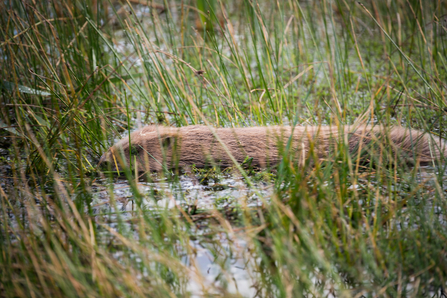
Photo © Hattie Lavender

Photo © Hattie Lavender
Defra has announced new legislation that will provide legal protections for beavers in England and could pave the way for the animals to be released into the wild under licence.
The Wildlife Trusts welcome the protections for “nature’s engineers”, calling for sensible management guidance and incentives for landowners to make space for beavers on their land.
Beavers are key to creating thriving wetland ecosystems – which are critical for climate adaptation –and provide a wealth of benefits for nature and people.
Government had promised the legislation would be laid in parliament on Tuesday 19th July but pulled the plug at the eleventh hour, causing uproar among nature charities and the wider public.
The change in legal status will make it an offence to deliberately capture, kill, disturb, or injure beavers, or damage their breeding sites or resting places – without holding the appropriate license. The legislation is scheduled to come into force in the autumn.
In parallel, Natural England is developing guidance on the management of beavers, setting out which actions will or will not require a licence, and where people can go for advice.
We’re delighted to see the Government give beavers the vital protections they deserve.Craig Bennett, Chief ExecutiveThe Wildlife Trusts
Craig Bennett, chief executive, The Wildlife Trusts, says:
“We’re delighted to see the Government give beavers the vital protections they deserve. It is important that guidance is now developed quickly to bring farmers and landowners on board with reintroductions of these brilliant animals, providing reassurance and, crucially, incentives to make space for beavers on their land.
“The widespread return of wild beavers can be a game changer for restoring lost wetlands, benefitting all kinds of wildlife, and helping people by holding water back in the landscape, reducing the risk of wildfires and reducing the risk of flooding downstream. Bringing back wild beavers isn’t just a dream, it is a critical part of addressing the climate and nature crises.”
Harry Barton, chief executive of Devon Wildlife Trust, says:
“Our long-term studies demonstrate how spectacularly beneficial beavers are for healthy rivers, creating vital wetland habitat, and helping landscapes adapt to climate change. It’s a relief that Government has listened to the public and moved forward with these protections, which provide communities across the country with opportunities to benefit from these remarkable creatures.”
“The legal framework must complement practical and sensible approaches to management. Landowners must also be given the right support and financial motivations to make space for beavers and the valuable wetlands they create.”
The Wildlife Trusts urge the Government to:
Beavers are a ‘keystone species’ and have a highly positive impact on their environment. The industrious herbivores are native to mainland Britain but were hunted to extinction in the 16th century by people who wanted their fur, meat, and scent glands. The end of beavers led to the loss of the mosaic of lakes, meres, mires, tarns, and boggy places that they were instrumental in creating.
The Wildlife Trusts are at the forefront of beaver reintroductions in the UK and released a record number of beavers in 2021, with seventeen beavers released into fenced areas. This came twenty years after Kent Wildlife Trust brought the first beavers back to Britain at Ham Fen near Sandwich in 2001.
In Scotland and Devon, Wildlife Trusts pioneered licensed trial releases of beavers into the wild, backed by extensive scientific research and strong partnerships, which demonstrated the many benefits of beavers and the most effective tools for managing them. Due to the success of both trials, beavers have been allowed to remain and spread naturally in the River Otter catchment, Devon and in Knapdale, Scotland.
In July 2022, news of beaver kits was announced by Derbyshire, Cheshire and Dorset Wildlife Trusts at enclosed projects on nature reserves. There are now more than 20 wild beaver territories on the River Otter catchment, monitored by Devon Wildlife Trust. Five kits arrived in 2022 to one of the original females in the River Otter Beaver Trial. The Welsh Beaver Project, led by Wildlife Trusts Wales, saw its first kit born at an enclosure on Cors Dyfi nature reserve, Montgomeryshire Wildlife Trust.
For more information on The Wildlife Trusts beaver reintroduction projects, visit:
For more information and updates about the beavers at our Idle Valley Nature Reserve go to our dedicated beaver webpage.